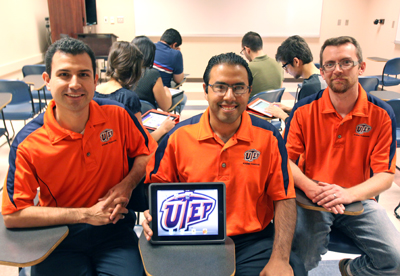By Daniel Perez
UTEP News Service
Mobile technology, when used correctly, can have a positive impact on student achievement in higher education, according to a group of UTEP researchers who recently shared their latest findings with an eager crowd of international educators in Atlanta.
Oscar Perez, an electrical engineering doctoral student and instructional technologist with the University’s Academic Technologies, is the principal investigator of a three-year study into the effect of iPads on academic performance at The University of Texas at El Paso.
He shared his findings, which showed that students who use an iPad improved their grades by as much as 10 percent, at the 120th American Society for Engineering Education conference the week of June 23. The research earned a 2012 Woody Everett Award for best paper in the organization’s Computers in Education division.
The UTEP findings are in line with a 2012 study of undergraduates and information technology by EDUCAUSE Center for Applied Research. The center’s study is based on input from more than 100,000 students from 195 institutions. It found that technology plays a critical role in today’s learning environment because it creates a sense of connectivity between the students and their university, their instructors and their peers.
Perez and his team have gathered three years worth of data from UTEP freshmen enrolled in the fall University 1301 “Introduction to Engineering” course. The 1301 courses acquaint new students with the campus and its resources. Participants answer surveys at different points during the semester to gauge their familiarity with technology and their interest in using it academically. The iPads are introduced six weeks into the course after the students have created an academic baseline.
“What we’re learning is that more and more students are expecting to use technology (in the classroom),” Perez said. “We’re promoting the use of technology that students already love.”
This was the third year the UTEP researchers presented at this annual conference because of the growing interest among institutions from K-12 to higher education about the role of technology in academics. Perez, who teaches the 1301 engineering course, said his interest began during the spring 2010 semester after he noticed more students using mobile technology devices on campus. He began his research later that year, a few months after the iPad was introduced. UTEP’s College of Engineering supplied the 16 GB iPads the first year.
Working with him were Virgilio Gonzalez, Ph.D., senior lecturer of electrical and computer engineering; Michael Pitcher, director of Academic Technologies (AT); Pedro Espinoza, AT instructional technologist; Hugo Gomez, AT training coordinator; Herminia Hemmitt, AT coordinator; Randy Anaya, AT student success coordinator; and Peter Golding, Ph.D., associate professor of metallurgical and materials engineering, who was revamping the 1301 engineering curriculum.
After surveying more than 108 students from four cohorts, the researchers found that mobile technology enhances academic achievement. Students’ final marks improved 2.5 percentage points after the first year and 10 points after the third. Also interesting is that the grades decreased when the students were allowed to use the iPads without supervision. They become distracted to the point where their grades suffered from 1.3 to 3.5 percentage points.
“It’s also important that the technology is used to match the teaching strategy, otherwise some students may not make the right connections or not use the technology fully,” said Pitcher, one of the co-PIs. “When the faculty member is involved, the students stay on task.”
Among the fans of the research is Charles H. Forsberg, Ph.D., professor emeritus of engineering from Hofstra University in New York. He moderated the team’s presentation in Atlanta.
“Studies such as this one are very important and useful to the academic community in that they provide data on the effectiveness of different teaching methods,” he said. “Such information is very helpful to professors who are looking for ways to improve their teaching and provide an improved learning experience for their students.”
Forsberg praised the team and said its participation at the national conference provided UTEP with positive visibility among the academic community.
Pablo Velarde, a junior electrical engineering major, was part of the study during the fall 2012 semester. He said using an iPad helped him with problem solving, note taking and presentations. He said students found it helpful, especially those who did not have a laptop. In the surveys, his peers lauded the program and suggested it be expanded because of its versatility and usefulness.
The research findings also showed that students want more classes that involve mobile technology, especially if it means they can save money through such items as eBooks. Because of student feedback, Pitcher said the team plans to offer an eBook for the fall 2013 1301 engineering course.
The call for more classes means there will be a need for more instructors comfortable in using technology. Academic Technologies is refining a program this summer to help faculty understand how they can use mobile technology in their courses.
“We want to take away the fear of technology and show instructors the opportunities,” Pitcher said. “We want to help them get past the ‘I can’t’ so they can reach their comfort level.”
Interested professors are encouraged to contact AT if they want more information about the 20 steps.
